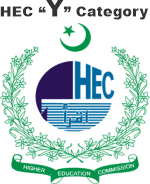TRANSLATION ERROR ANALYSIS OF LEARNERS’ TRANSLATIONS IN BISE MULTAN EXAMINATION 2020
Keywords:
Translation Assessment, Translation Teaching, Text Analysis , Systemic Functional Grammar, Translation Error AnalysisAbstract
Translation is considered one of the most important skills in studying and learning a second or foreign language. It is termed as a skill or a craft which is thought to be enjoyed by those who aspire to grab a sound command of a second language. Translation holds an important place in the curriculum of English up till graduation in Pakistan; however, students face many problems in translating a text, especially at an intermediate level. This paper is based on a small-scale pilot project, which is part of my PhD Research Project that used systemic functional grammar to investigate a systematic method for analysing translation errors in the (intermediate level) learners’ translations. The study investigates how SFG-based text analysis can be used for translation error analysis in the educational context, contrary to traditional structure-oriented analysis, based on the shared focus on meaning between translation studies and SFG. This study has taken the sample using cluster sampling randomly from learners’ translations that they had done in BISE Multan English papers. The study discovered that it is possible to describe and classify errors in target texts using meaning systems and that the resulting error classification allows for an accurate explication of the nature of errors, which would otherwise be described simply as "incorrect and inappropriate" translations. This study is highly relevant for highlighting the difficulties and concerns encountered by English language teachers and examiners while they assess and evaluate students' translations.
Downloads
References
Angelelli, C. (2009). Using a rubric to assess translation ability: Defining the construct. American Translators Association Scholarly Monograph Series, 26(6),13-47. https://doi.org/10.1075/ata.xiv.03ang.
Bowker, L. (1999). Exploring the potential of corpora for raising language awareness in student translators. Language Awareness, (8-3),160-173.
Butt, D., Fahey, R., Feez, S., Spinks, S., & Yallop, C. (2000). Using Functional Grammar. National Centre for English Language Teaching and Research, Macquarie University.
Catford, J. (1965). A linguistic theory of translation. London: Oxford University Press.
Halliday, M. (1994). An introduction to functional grammar. London: Edward Arnold.
House, J. (2001) ‘How do we know when a translation is good?’ In E. Steiner and C. Yallop (Eds) Exploring Translation and Multilingual Text Production: Beyond Content. Berlin: Mouton de Gruyter, 127–160.
House, J. (1986). Acquiring translational competence in interaction. In J. House and B. Shoshana (Eds), Interlingual and intercultural communication: Discourse and cognition in translation and second language acquisition studies, (179-191). Tübingen: Narr.
Kiraly, C. (1995). Pathways to translation. Kent & London: The Kent University Press.
Kiraly, Donald C. 2000. A Social Constructivist Approach to Translator Education. Manchester: St. Jerome.
Nagyp János 2022 Mira Kim, Jeremy Munday, Zhenhua Wang & Pin Wang (Eds.). (2021).
Systemic Functional Linguistics and Translation Studies. Bloomsbury Academic,
pp. ISBN:978-1-3500-9186-3. © Akadémiai Kiadó, Budapest.
Nord, Christiane. 1997. Translating as a Purposeful Activity. Manchester: St. Jerome.
Pearson, Jennifer. 1999. Using Specialized Comparable Corpora to Evaluate Student Translations. In PALC ’99: Practical Applications in Language Corpora, eds.Barbara Lewandowska-Tomaszczyk and Patrick James Melia, 541-552. Frankfrut am Main: Peter Lang.
Pearson, Jennifer. 2003. Using parallel texts in the translator training environment. In Corpora in Translator Education, eds. Federico Zanettin, Silvia Bernardini and Dominic Stewart, 15-24. Manchester: St. Jerome.
Pym, Anthony. 2003. Redefining Translation Competence in an Electronic Age. In Defence of a Minimalist Approach. Meta 48: 481-497.
Said Mashadi. 2002. Menilai Terjemah. Jurnal Ilmiah Sastra Bahasa vol. 7 no. 2 (Dec. 2002), page 56.
Schäffner, Christina. 2002. The Role of Discourse Analysis for Translation and in Translator Training: Status, Needs, Methods. Clevedon: Multilingual Matters
Tyupa, Sergiy (2011) Back-translation: Theoretical Framework and Practical Implications. (Doctoral dissertation. Jagiellonian University, Kraków).
Williams, Geoff. 1994. Using Systemic Grammar in Teaching Young Learners: An Introduction. Melbourne: Macmillan Education Australia.

Downloads
Published
Issue
Section
License
Copyright (c) 2024 PAKISTAN ISLAMICUS (An International Journal of Islamic & Social Sciences)

This work is licensed under a Creative Commons Attribution 4.0 International License.
This work is licensed under a Creative Commons Attribution 4.0 International License.
































